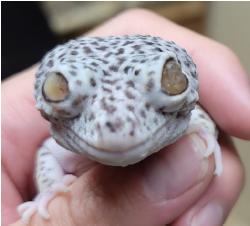Hypovitaminosis A in Leopard Geckos and Chameleons
Why is vitamin A important?
Vitamin A is an essential, fat-soluble vitamin that is produced from carotenoids such as beta carotene. This vitamin plays an important role in the body including skin health, red blood cell production, antibody production, and immune responses to pathogens.
Why is preformed vitamin A important?
Insectivores, such as leopard geckos, chameleons, toads, and some frogs need preformed vitamin A because they are not able to convert beta-carotene precursors into vitamin A. It’s important to make sure the multivitamin your insectivore receives is appropriate because not all commercial brands have vitamin A and instead contain beta-carotene.
What does hypovitaminosis A look like?
Because vitamin A is important for skin health, many vitamin A deficiencies can present as primary skin problems. When the cells aren’t able to differentiate, they can block normal glands resulting in swollen eyelids, salivary glands, or lips, hemipenal plugs, poor shed (dysecdysis), less vibrant colors, ear abscesses, and sometimes respiratory tract infections. Because the skin cells are no longer able to perform their normal protective function, we can see secondary infections develop.
A common presentation of hypovitaminosis A in leopard geckos is retained eye caps (see image). This is actually a build up of skin cells overlying the eye itself. It is possible the eyes can develop corneal ulcers. Vision can be impaired due to the corneal scarring. 
How is hypovitaminosis A treated/prevented?
Your veterinarian will remove the retained epithelium. If your leopard gecko has retained eye caps, do NOT attempt to remove these on your own. It can damage the eye and potentially cause blindness. Your veterinarian will also most likely recommend starting or increasing your pet’s vitamin A supplements, With appropriate treatment and prevention, most make a full recovery.
Can I give too much vitamin A to my pet?
While rare, it is possible to give too much vitamin A when trying to correct a deficiency. This typically occurs for tortoises receiving vitamin A injections. Please be sure to consult with your veterinarian about how often you should be giving your pet a multivitamin.



